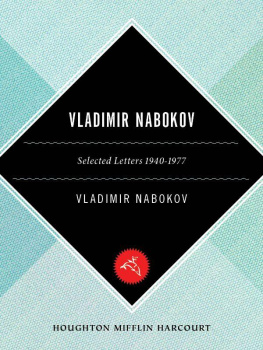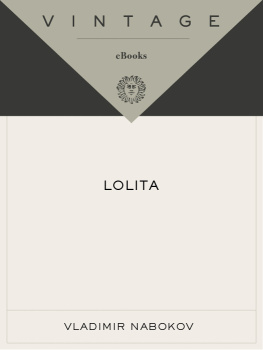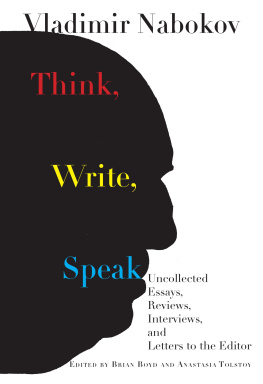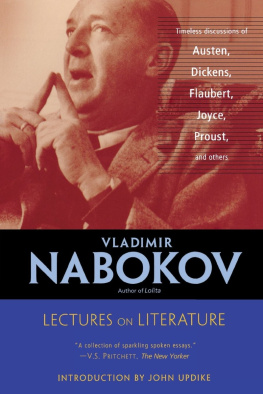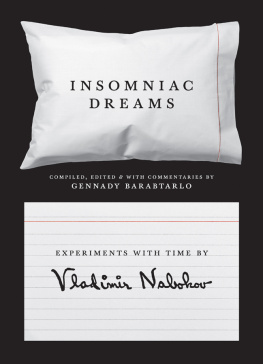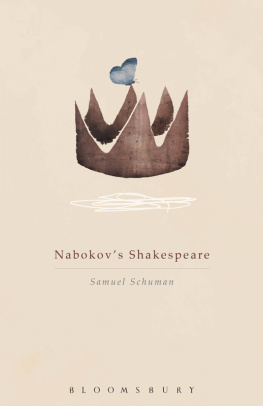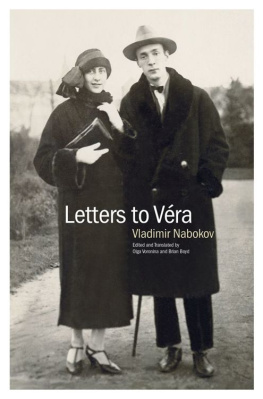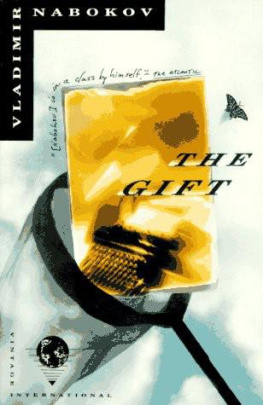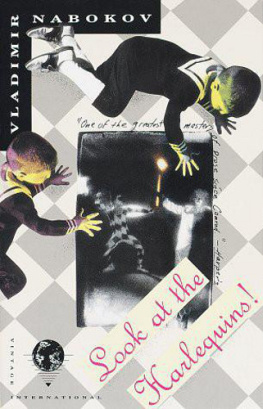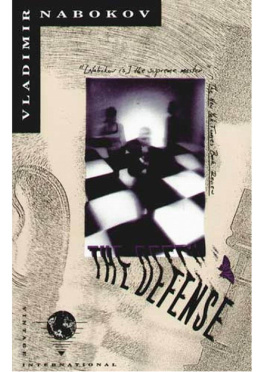
Table of Contents
HBJ
Copyright 1989 by the Article 3 b Trust
Under the Will of Vladimir Nabokov.
Introduction 1989 by Dmitri Nabokov.
All rights reserved.
No part of this publication may be reproduced or transmitted in any form or by any means, electronic or mechanical, including photocopy, recording, or any information storage and retrieval system, without permission in writing from the publisher.
For information about permission to reproduce selections from this book, write to Permissions, Houghton Mifflin Harcourt Publishing Company, 215 Park Avenue South, New York, New York 10003.
The Library of Congress has cataloged the print edition as follows:
Nabokov, Vladimir Vladimirovich, 18991977.
Vladimir Nabokov : selected letters, 19401977.
Includes index.
1. Nabokov, Vladimir Vladimirovich, 1899-1977Correspondence. 2. Authors, Russian20th centuryCorrespondence. 3. Authors, American20th centuryCorrespondence. I. Nabokov, Dmitri. II. Bruccoli, Matthew Joseph, 1931 III. Title.
PG 3476. N 3 Z 48 1989 813'.54 [B] 88-26793
ISBN 0-15-164190-0
eISBN 978-0-544-10655-0
v1.1012
Acknowledgments
Acknowledgment is made for the generous assistance of the following institutions and individuals: Bryn Mawr College Library; Cornell University Libraries; Harvard University Libraries; Hoover Institution on War, Revolution and Peace; The Library of Congress; Thomas Cooper Library, University of South Carolina, Interlibrary Loan: Daniel Boice, Yvonne Andrews, Cathie Gottlieb; Roger Angell; Alfred Appel, Jr.; Alison M. K. Bishop; Paul Carlton; Graham Greene; Alison Bishop Jolly; Pat Hitchcock O'Connell; Gina Peterman; Lord Weidenfeld. Prof. Brian Boyd generously volunteered to read this volume in typescript.
Introduction
Dmitri Nabokov
I have always had a number of parts lined up in case the muse failed. A lepidopterist exploring fabulous jungles came first. Then there was the chess grand master, then the tennis ace with an unreturnable service, then the goalie saving a historical shot, and finally, finally, the author of a pile of unknown writings Pale Fire, Lolita, Ada that my heirs discover and publish.V LADIMIR N ABOKOV , 1977 BBC interview...turning to the title-page butterfly, its head is that of a small tortoise, and its pattern that of a common Cabbage White butterfly (whereas the insect in my poem is clearly described as belonging to a group of small blue butterflies with dotted undersides), which is as meaningless ... as would be a picture of a tuna fish on the jacket of Moby Dick. I want to be quite clear and frank: I have nothing against stylization, but I do object to stylized ignorance.V LADIMIR N ABOKOV , 1959 letter to publisherI do have a story for youbut it is still in my head; quite complete, however; ready to emerge; the pattern showing through the wingcases of the pupa.V LADIMIR N ABOKOV , 1946 letter to Katharine A. White
To give credits where credits are due, I express my gratitude to friends and scholars for providing missing letters; to William Jovanovich and Julian Muller of Harcourt Brace Jovanovich for their patience during what was a long and sometimes fitful gestation; and, above all, to Matthew Bruccoli, not only for his valuable collaboration, but also for his gentle encouragement and outward calm as deadlines passed like telegraph poles glimpsed from a speeding train.
Procrastination, however, can bear unexpected fruit. Thus, the appearance of this volume coincides felicitously with a kind of worldwide Nabokov renaissance. Editions ranging from the substantial to the complete are appearing in unprecedented abundance. Of special note abroad are the uniform Rowohlt series in Germany, the Anagrama books in Spain, Guanda's semi-annual cadence for some sixteen volumes together with Bompiani's projected plump two-volume Classici in Italy, and the Rivages editions and the forthcoming Pliade in France. Russian versions of Nabokov's worksincluding various translations from his Englishare proliferating. Here we have two basic categories: the meticulously prepared Collected Works in progress at Ardis of Ann Arbor (a product, as literature is called these days, of guaranteed fidelity) on one hand, and, on the other, the results of a Soviet rush to get Nabokov into print while glasnost' and paper supplies last. This second product varies wildly. There is a handful of refined, courageous scholars (one in particular) struggling for accuracy; there are well-meaning but shoddy reprints from whatever sources were available; there are some pretty awful translations from the English; and, alas for glasnost' , we see from the 1988 publication of Dar [The Gift] , that the claws of political censorship are but half-clipped.
In Nabokov's adopted country there is good news indeed. Nearly all his fictional works are being assembled under the roomy roof of a new publisher, and an extensive, well produced, and properly distributed American Nabokov should soon be available.
The letters included in this volume represent only a small part of Nabokov's correspondence. They have been selected with certain general criteria in mind, and most of them reflect one or more of the following facets of Nabokov:
- his evolution as a writer and insights into his creative process
- his academic activity
- his passions: lepidoptera and chess
- certain important details of his life
- his family relationships
- his artistic and personal morality
- the humor and originality with which he composed everything from a grocery list or the dressing-down of a derailed biographer to letters of importance regarding family or artistic matters.
The above are not dry scholastic categories, but themes that will fascinate the reader as they develop with the intricacy, symmetry, and suspense of a multifaceted novel by Nabokov. And Lolita's incredible adventures alone could be a novel.
When he was preparing his books for publication, Nabokov's occasional absent-mindedness during the physical process of writing was counterbalanced by microscopic attention to detail at the text's crucial stages: the exactitude of thought and often the research that creation entailed during the work's conception, and a final check of every word in proof. In the interim, the "passion of the scientist" could propel him past a lapse, but the "precision of the artist" compelled him to return eventually and fix that lapse. The occasional typo or other error will, of course, haunt the most carefully checked text, but Nabokov did all he could to forestall such mishaps, and a sampling of his corrections, particularly those to the proofs of the first edition of Lolita , is included to illustrate the meticulous care he gave a nascent work.
The preparation of these lists for the present volume meant, in effect, retracing every detail of Nabokov's 1955 revisions, to be certain that the ghosts of typos and rejects, as well as the author's emendations, had been properly resurrected.
Such attentive checking of Nabokov texts yields welcome by-products. One is reminded, for instance, that, no matter how many times one rereads his works, there is always some previously undiscovered surprise. Take the encounter with Rita described at the beginning of Chapter 26, Part Two, of Lolita. The episode is not a crucial element of the book, and the casual reader might tend to gloss over it. That would be a pity:
She was twice Lolita's age and three quarters of mine: a very slight, dark-haired, pale-skinned adult, weighing a hundred and five pounds, with charmingly asymmetrical eyes, an angular, rapidly sketched profile, and a most appealing ensellure to her supple backI think she had some Spanish or Babylonian blood. I picked her up one depraved May evening somewhere between Montreal and New York, or more narrowly, between Toylestown and Blake, at a darkishly burning bar under the sign of the Tigermoth, where she was amiably drunk: she insisted we had gone to school together, and she placed her trembling little hand on my ape paw.
Next page
